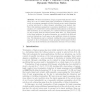Free Online Productivity Tools
i2Speak
i2Symbol
i2OCR
iTex2Img
iWeb2Print
iWeb2Shot
i2Type
iPdf2Split
iPdf2Merge
i2Bopomofo
i2Arabic
i2Style
i2Image
i2PDF
iLatex2Rtf
Sci2ools
116
click to vote
ICLP
2004
Springer
2004
Springer
Termination of Logic Programs Using Various Dynamic Selection Rules
Abstract. We study termination of logic programs with dynamic scheduling, as it can be realised using delay declarations. Following previous work, our minimum assumption is that derivations are input-consuming, introduced to define dynamic scheduling in an abstract way. Since this minimum assumption is sometimes insufficient to ensure termination, we consider here various additional assumptions on the permissible derivations. In one dimension, we consider derivations parametrised by any property that the selected atoms must have, e.g. being ground in the input positions. In another dimension, we consider both local and non-local derivations. In all cases, we give sufficient criteria for termination. The dimensions can be combined, yielding the most comprehensive approach so far to termination of logic programs with dynamic scheduling. For non-local derivations, the termination criterion is even necessary.
Related Content
| Added | 01 Jul 2010 |
| Updated | 01 Jul 2010 |
| Type | Conference |
| Year | 2004 |
| Where | ICLP |
| Authors | Jan-Georg Smaus |
Comments (0)

